Notes
- ↑ "Interagency Border Inspection System (IBIS) Fact Sheet". Archived 2006-04-27 at the Wayback Machine CBP.gov.
The Interagency Border Inspection System (IBIS) is a United States computer-based system that provides the law enforcement community with files of common interest. IBIS provides access to the Federal Bureau of Investigation National Crime Information Center (NCIC) and allows its users to interface with all 50 U.S. states via the National Law Enforcement Telecommunications System (NLETS). IBIS physically resides on the Treasury Enforcement Communications System (TECS) at the U.S. Customs and Border Protection Data Center.
Regulatory and law enforcement personnel from more than 20 federal agencies or bureaus use IBIS, including:
Field access is provided by a network with more than 24,000 IBIS terminals, located at ports of entry including border checkpoints, seaports, and airports to track information on suspect individuals, businesses, vehicles, aircraft, and watercraft. IBIS terminals can also be used to access records on wanted persons, stolen vehicles, vessels or firearms, license information, criminal histories, and previous federal inspections, allowing the border enforcement agencies to focus their limited resources on those potential non-compliant travelers. [1]
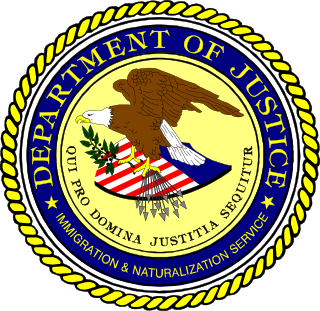
The United States Immigration and Naturalization Service (INS) was an agency of the U.S. Department of Labor from 1933 to 1940 and the U.S. Department of Justice from 1940 to 2003.
U.S. Immigration and Customs Enforcement is a federal law enforcement agency under the U.S. Department of Homeland Security. ICE's stated mission is to protect the United States from cross-border crime and undocumented immigration that threaten national security and public safety.
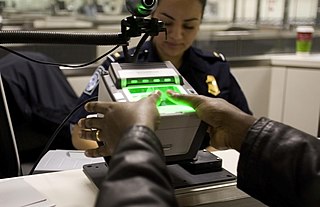
United States Visitor and Immigrant Status Indicator Technology is a U.S. Customs and Border Protection (CBP) management system. The system involves the collection and analysis of biometric data, which are checked against a database to track individuals deemed by the United States to be terrorists, criminals, and illegal immigrants. US-VISIT is accessed by 30,000 users from federal, state, and local government agencies. Upon Presidential approval of the 2013 Continuing resolution the US-VISIT program officially became the Office of Biometric Identity Management (OBIM), save for portions of the agency which performed overstay analysis being transferred into U.S. Immigration and Customs Enforcement and biometric Entry and Exit operations which became a part of U.S. Customs and Border Protection.
In the United States, a special agent is an official title used to refer to certain investigators or detectives of federal, military, tribal, or state agencies who primarily serve in criminal investigatory positions. Additionally, some special agents operate in criminal intelligence, counterterrorism, or counterintelligence-based roles as well, with one or all of these roles occasionally taking precedence over criminal investigatory tasks.

The United States Customs Service was a federal law enforcement agency of the U.S. federal government. Established on July 31, 1789, it collected import tariffs, performed other selected border security duties, as well as conducted criminal investigations.

The Canada Border Services Agency is a federal law enforcement agency that is responsible for border control, immigration enforcement, and customs services in Canada.

United States Customs and Border Protection (CBP) is the largest federal law enforcement agency of the United States Department of Homeland Security. It is the country's primary border control organization, charged with regulating and facilitating international trade, collecting import duties, as well as enforcing U.S. regulations, including trade, customs, and immigration. CBP is one of the largest law enforcement agencies in the United States. It has a workforce of more than 45,600 federal agents and officers. It is headquartered in Washington, D.C.

The Federal Law Enforcement Training Centers serves as an interagency law enforcement training body for 105 United States government federal law enforcement agencies. The stated mission of FLETC is to "...train those who protect our homeland". Through the Rural Policing Institute (RPI) and the Office of State and Local Training, it provides tuition-free and low-cost training to state, local, campus and tribal law enforcement agencies.
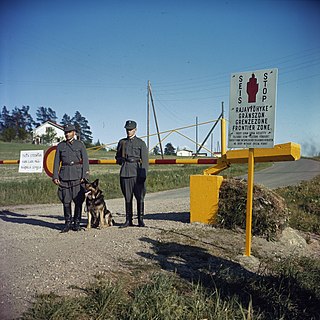
A border guard of a country is a national security agency that ensures border security. Some of the national border guard agencies also perform coast guard and rescue service duties.

Air and Marine Operations (AMO) is a federal law enforcement component within U.S. Customs and Border Protection (CBP), an agency of the United States Department of Homeland Security (DHS). AMO's mission is to protect the American people and nation's critical infrastructure through the coordinated use of air and marine assets to detect, interdict and prevent acts of terrorism and the unlawful movement of people, illegal drugs, and other contraband toward or across the borders of the United States. Air and Marine Operations Agents and Officers are endowed with the authority to enforce Title 8 and Title 19 (Customs) of the United States Code in addition to the general law enforcement powers bestowed upon federal law enforcement agents.

The Under Secretary for Terrorism and Financial Intelligence is a position within the United States Department of the Treasury responsible for directing the Treasury's efforts to cut the lines of financial support for terrorists, fight financial crime, enforce economic sanctions against rogue nations, and combat the financial support of the proliferation of weapons of mass destruction. The Under Secretary is appointed by the President and confirmed by the Senate.

The Organized Crime Drug Enforcement Task Force (OCDETF) is a federal drug enforcement program in the United States, overseen by the Attorney General and the Department of Justice. The principal mission of the OCDETF program is to identify, disrupt, and dismantle the major drug trafficking operations and tackle related crimes, such as money laundering, tax and weapon violations, and violent crime, and prosecute those primarily responsible for the nation's drug supply.

The Secure Electronic Network for Travelers Rapid Inspection (SENTRI) provides expedited U.S. Customs and Border Protection (CBP) processing, at the U.S.–Mexico border, of pre-approved travelers considered low-risk. Voluntarily applicants must undergo a thorough background check against criminal, customs, immigration, law enforcement, and terrorist databases; a 10-fingerprint law enforcement check; and a personal interview with a CBP Officer. The total enrollment fee is $120.00, and SENTRI status is valid for 5 years.
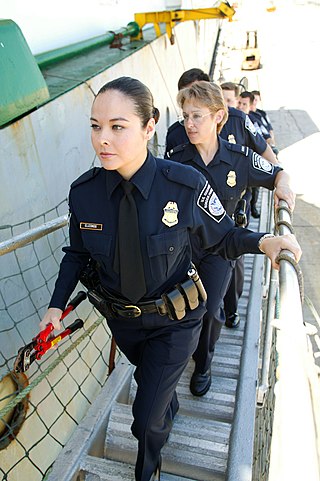
The federal government of the United States empowers a wide range of federal law enforcement agencies to maintain law and public order related to matters affecting the country as a whole.
A specialist law enforcement agency is a law enforcement agency which specialises in the types of laws it enforces, or types of activities it undertakes, or geography it enforces laws in, or these in combination.

In the United States, a federal crime or federal offense is an act that is made illegal by U.S. federal legislation enacted by both the United States Senate and United States House of Representatives and signed into law by the president. Prosecution happens at both the federal and the state levels and so a "federal crime" is one that is prosecuted under federal criminal law and not under state criminal law under which most of the crimes committed in the United States are prosecuted.
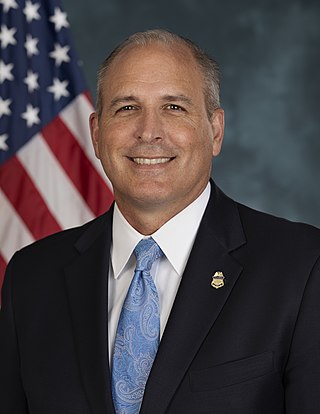
Mark A. Morgan is an American law enforcement official who served as the Chief Operating Officer and acting Commissioner of U.S. Customs and Border Protection from July 5, 2019, to January 20, 2021.
A customs declaration is a form that lists the details of goods that are being imported or exported when a citizen or visitor enters a customs territory. Most countries require travellers to complete a customs declaration form when bringing notified goods across international borders. Posting items via international mail also requires the sending party to complete a customs declaration form.
Operation Dark HunTOR was an international law enforcement operation targeting opioid trafficking and other illegal activities on The Onion Router (TOR). The operation, which was conducted across the United States, Australia, and Europe, over a period of 10 months. In addition Europol released a statement that said the operation was composed of a series of separate but complementary actions in Australia, Bulgaria, France, Germany, Italy, the Netherlands, Switzerland, the United Kingdom and the United States, with coordination efforts led by Europol and Eurojust; which greatly expands on the initial number of countries that the US press releases indicated.